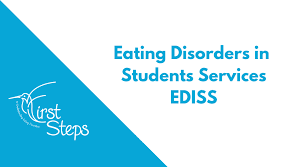Friday, 15 May 2020
People who are struggling to cope with eating disorders during the COVID-19 lockdown are getting increased support from an East Midlands charity and communication experts at the University of Nottingham.
Around 1.25 million people in the UK have a diagnosis of eating disorders such as anorexia and bulimia, with many more undiagnosed. As some of the usual avenues to face-to-face advice, counselling and support are now closed due to the pandemic, many people are finding it hard to continue managing their disorder and their recovery from it.
Since the lockdown, the Derby-based charity, First Steps ED, has been working with university researchers and medical professionals to deliver a new package of support remotely and in a more intensive way, to try to address any interruption in support because of social distancing.

COVID-19 has unmistakably taken a significant toll on those who are struggling. Eating disorders by their very nature thrive in silence and isolation which due to recent social distancing measures is exactly where these individuals find themselves. In some cases, where people have moved back into the family home, they may feel less control, and have to work even harder to hide their struggles with food and body image. The current chaotic nature of the world can, in some cases, revive influences of past bad experiences and trauma. These can prompt a dependence on this relationship with food as a source of control or comfort in reaction to the suspension of normal life.
One recent service user who has been grateful for the increased online support said: “The pandemic has been a really challenging time for my recovery. The increased time spent at home and the isolation away from friends and activities has left me with a lot more time and fewer distractions, making it difficult to focus on anything but my body. The messages around weight, body size and health are everywhere and the vast increase in online workout videos and articles on how to avoid snacking/weight gain have massively increased my fears around eating and sedentarism. The pandemic has led to removal of face to face support, making it more difficult to be honest about how difficult the situation is feeling.”
 First Steps ED charity (EDISS section)
First Steps ED charity (EDISS section)
In normal times First Steps ED delivers a specially tailored model of their services (EDISS) to student support departments at universities across the East Midlands. This has now moved online and uses secure video clinic software to provide consistent reliable support to students and university staff who are struggling with eating disorders and their families, including:
- Peer support
- Counselling
- Recovery and Self-Help Groups/ Drop in Groups
- Befriending
- Volunteering opportunities
 Dr Heike Bartel, University of Nottingham
Dr Heike Bartel, University of Nottingham
Dr Heike Bartel from the University of Nottingham’s School of Cultures, Languages and Area Studies, carries out research into narratives of food and eating. Her current work is focusing on men and boys in particular, through a project called Hungry for Words. Heike said:
“First Steps ED, the charity behind EDISS, has been our research partner since 2016 and has helped us to drive forward innovative research in the neglected area of eating disorders in men and boys. In the current pandemic their committed team is really stepping up to address the needs of our student community in sensitive, creative and technically advanced ways. Their usual face-to face service is and will remain invaluable, however, their current online support can be seen as shaping the future – beyond COVID-19 – and how a range of services can be delivered in a constantly changing society.”
 Rob Smith, First Steps ED
Rob Smith, First Steps ED
Rob Smith, First Steps ED Student Services Co-ordinator, said: “The impact of COVID-19 on our service users is unmistakable, the current global uncertainty is creating an environment of isolation and loneliness for these individuals, with barriers to accessing their vital support networks. We are seeing people recently determined to find resolution to their struggles, becoming increasingly disheartened by the inescapable adverse situation they find themselves in, with the temptation to give in further to their eating disorder becoming stronger each day.”
EDISS is also preparing to step up activity significantly in the near future once lockdown measures are reduced and are anticipating unprecedented numbers of referrals into the service.
Story credits
For more information please contact Heike Bartel via email heike.bartel@nottingham.ac.uk or Rob Smith, First Steps ED, via email robs@firststepsed.co.uk or Emma Rayner, Media Relations Manager for the Faculty of Arts on 0115 951 5793 emma.rayner@nottingham.ac.uk
Notes to editors:
About the University of Nottingham
Ranked 32 in Europe and 16th in the UK by the QS World University Rankings: Europe 2024, the University of Nottingham is a founding member of the Russell Group of research-intensive universities. Studying at the University of Nottingham is a life-changing experience, and we pride ourselves on unlocking the potential of our students. We have a pioneering spirit, expressed in the vision of our founder Sir Jesse Boot, which has seen us lead the way in establishing campuses in China and Malaysia - part of a globally connected network of education, research and industrial engagement.
Nottingham was crowned Sports University of the Year by The Times and Sunday Times Good University Guide 2024 – the third time it has been given the honour since 2018 – and by the Daily Mail University Guide 2024.
The university is among the best universities in the UK for the strength of our research, positioned seventh for research power in the UK according to REF 2021. The birthplace of discoveries such as MRI and ibuprofen, our innovations transform lives and tackle global problems such as sustainable food supplies, ending modern slavery, developing greener transport, and reducing reliance on fossil fuels.
The university is a major employer and industry partner - locally and globally - and our graduates are the second most targeted by the UK's top employers, according to The Graduate Market in 2022 report by High Fliers Research.
We lead the Universities for Nottingham initiative, in partnership with Nottingham Trent University, a pioneering collaboration between the city’s two world-class institutions to improve levels of prosperity, opportunity, sustainability, health and wellbeing for residents in the city and region we are proud to call home.
More news…